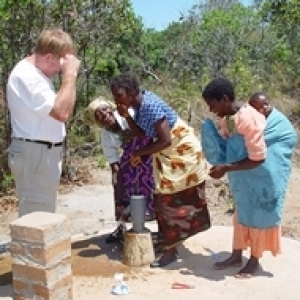Cassava
13th April 2016:
Planting cassava in the rain are staff from the factory, office and centre for learning. Cliona, Alfred, Rose, Cecelia and Providence.
This is a new variety we found in a village about 60 km from the factory.
We are planting for food, but also to show the girls who come for lessons on Saturdays and at other times.
If Malawians were to eat cassava with their maize during the year, they might diminish the length of the hungry season.
The President, yesterday declared a state of emergency on the famine situation facing the county for the past months.
Today he blamed God for the situation, but no one remembers God being elected President and supreme ruler!
Of course better farm management would have helped, but there are few politicians minding the shop just now.
Velvet bean (from yesterday's blog) would be a great help as well.
Note:
Cassava has nearly twice the calories than that of potatoes and perhaps one of the highest value calorie food for any tropical starch rich tubers and roots. 100 g root provides 160 calories. Their calorie value mainly comes from sucrose which accounts for more than 69% of total sugars. Amylose (16-17%) is another major complex carbohydrate sources.
Cassava is very low in fats and protein than in cereals and pulses. Nonetheless, it has more protein than that of other tropical food sources like yam, potato, plantains, etc.
As in other roots and tubers, cassava too is free from gluten. Gluten-free starch is used in special food preparations for celiac disease patients.
Young tender cassava (yuca) leaves are a good source of dietary proteins and vitamin K. Vitamin-K has a potential role in bone mass building by promoting osteotrophic activity in the bones. It also has established role in the treatment of Alzheimer's disease patients by limiting neuronal damage in the brain.
Cassava is a moderate source of some of the valuable B-complex group of vitamins such as folates, thiamin, pyridoxine (vitamin B-6), riboflavin, and pantothenic acid.
Itis one of the chief sources of some important minerals like zinc, magnesium, copper, iron, and manganese for many inhabitants in the tropical belts. In addition, it has adequate amounts of potassium (271 mg per 100g or 6% of RDA). Potassium is an important component of cell and body fluids that help regulate heart rate and blood pressure.
- 0
- 0
- Nikon COOLPIX AW120
- 1/200
- f/4.3
- 9mm
- 125

Comments
Sign in or get an account to comment.


